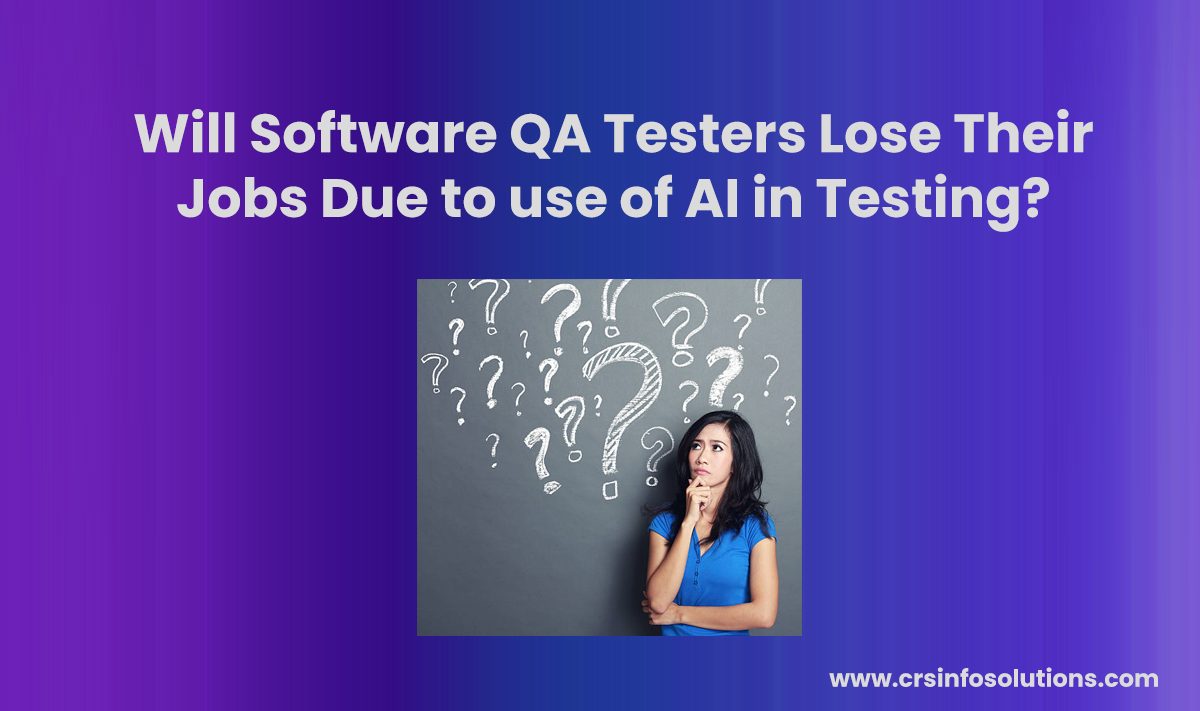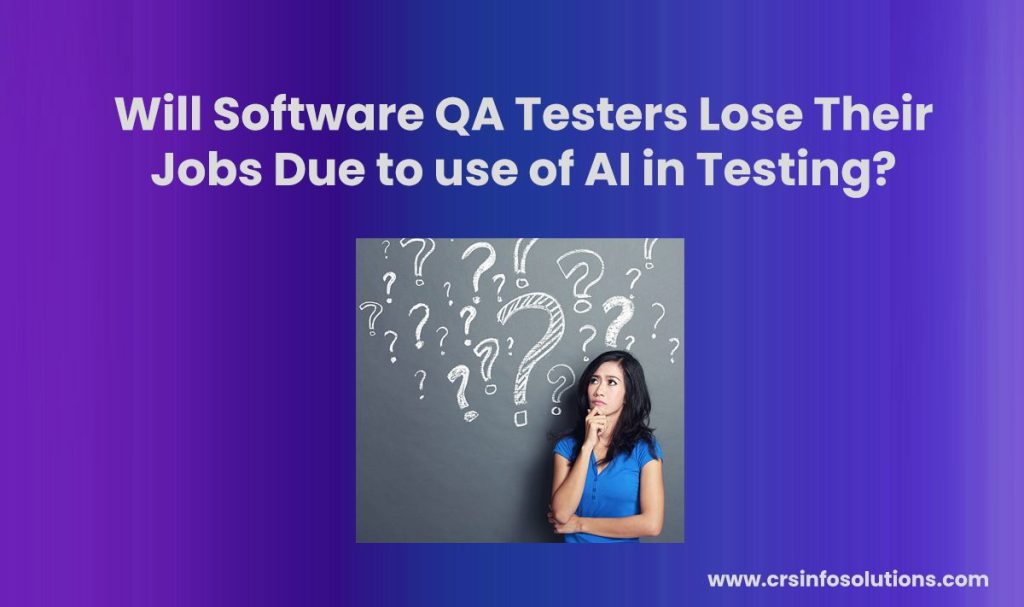
Will Software QA Testers Lose Their Jobs Due to use of AI in Testing?

As artificial intelligence (AI) rapidly advances, many wonder if it will render software testers redundant. The reality is that, rather than making testers obsolete, AI is more likely to reshape the field significantly. In fact, AI’s greatest influence may impact software developers even more deeply. Here’s an exploration of how AI could transform software testing, enhancing roles rather than eliminating them.
A Brief History of Test Automation and Tester Evolution
Automation has long been a part of software testing, starting with automated test execution replacing repetitive tasks traditionally performed by manual testers. While this change freed testers to design better tests and automate them further, it did not remove their role. Later, agile and DevOps methodologies aimed to make testers unnecessary by embedding testing into development. However, developers often preferred to write code over testing it, keeping the need for dedicated testers intact. Testers have since expanded their roles to include exploratory and end-to-end testing, ensuring that entire business processes function smoothly across different application boundaries.
See also: What Are Salesforce AI Agents?
How AI Will Transform Software Testing?
AI has the potential to be a powerful assistant in areas where testers may struggle. Unlike traditional automation, which enhances specific tasks, AI can reshape the testing process.
Testers often perform tasks that are repetitive, time-sensitive, and detail-oriented. These include:
- Waiting for a new release to test
- Analyzing the results of automated tests
- Maintaining tests that fail due to application updates
- Reporting testing status and metrics
By handling these time-consuming tasks, AI can alleviate bottlenecks, allowing testers to focus on strategic work.
Our Salesforce online training program is designed for those willing to start learning, enroll for free demo!
Immediate AI Advancements in QA
Current AI-powered testing tools offer significant time-saving features. For instance, some tools prioritize tests based on their likelihood of identifying defects, perform “auto-healing” on broken tests, or even pre-populate defect reports. Shortly, we can expect tools that autonomously generate tests from use cases or by observing human testers. While fully autonomous testing may be a while off due to the unique data requirements of proprietary business processes, AI will likely move towards human-supervised testing to enhance productivity without replacing testers entirely.
AI can also help optimize test cycles by prioritizing high-impact tests. Understanding code changes and previous test results allows AI to run the most crucial tests, accelerating feedback loops. Additionally, if AI can predict error-prone areas, human testers can target their exploratory efforts more effectively.
See also Salesforce QA Interview Questions and Answers
AI in Defect Reporting and Insights
AI’s ability to generate natural language descriptions, as demonstrated by tools like ChatGPT, has potential benefits for defect reporting. An AI-generated report can provide clear insights into test failures, often with greater clarity and speed than a human hurriedly documenting results. Moreover, AI can analyze testing data and produce verbal summaries, making it easier for stakeholders to understand software quality metrics and process improvement recommendations without deep technical knowledge.
Will AI Replace Testers or Developers?
Whether AI is more likely to replace testers or developers is complex. While generating tests may be simpler than creating code, designing tests requires a creative approach to breaking software, which is challenging for AI. Developing an entire software system involves orchestrating multiple components, whereas designing tests for individual features is generally more straightforward but equally essential.
AI-assisted humans and human-assisted AI will likely be the ideal approach. Complex testing scenarios, such as validating a process that begins in a mobile app, proceed to Salesforce and ends in SAP, will still require human oversight and expertise.
See also: Salesforce Developer interview questions for 5 years experience
The Future: AI-Enhanced Testing, Not Job Loss
While AI may provoke anxiety around job security, its goal is to improve efficiency rather than replace skilled workers entirely. For testers, the risk of replacement is lower because AI and machine learning (ML) technologies are still maturing. Furthermore, while big tech companies invest heavily in AI, these technologies have limitations. AI currently excels in familiar scenarios but needs help with novel ones, which limits its potential as a total replacement.
Additionally, the cost of AI testing tools could make widespread adoption slower, especially among smaller companies. Much like automation tools did not eliminate testing roles, AI will likely enhance the work of testers, allowing them to take on more strategic, innovative tasks rather than repetitive ones.
How Testers Can Adapt to an AI-Driven Future
To remain competitive, testers should develop AI and ML skills, familiarizing themselves with AI testing tools and methodologies. Embracing AI as a collaborator rather than a competitor can empower testers to stay relevant and secure their roles in the evolving QA landscape.
With proactive learning and adaptability, testers can capitalize on AI’s advantages, strengthening their positions and transforming their roles into ones that align with future advancements. The era of AI-enhanced software testing is here, but rather than threatening jobs, it presents a chance for growth and innovation in the testing field.
Why Salesforce is a Smart Career Move Amid AI Advancements in QA?
With the rapid advancements in AI impacting QA testing roles, shifting to Salesforce could be a strategic choice for a more secure and versatile career path. Learning Salesforce CRM opens up multiple career opportunities beyond traditional QA roles, such as becoming an administrator, developer, consultant, or even a Salesforce architect. The demand for Salesforce specialists is soaring globally, with lucrative opportunities in regions like the USA, India, and Canada. Salesforce expertise is sought after across industries, making it a valuable skill that could ensure long-term career stability and growth despite technological shifts.
Learn Salesforce at CRS Info Solutions for Real-World Skills and Certification Success
For those interested in learning Salesforce, CRS Info Solutions stands out as an excellent choice. With a team of highly experienced tutors, they provide real-time training that immerses students in practical, hands-on experience. Our Salesforce online training program is designed to thoroughly prepare students for certification exams and interview processes, ensuring they’re job-ready upon completion. Additionally, CRS Info Solutions offers a free demo session for those with questions about the course, allowing prospective students to explore the curriculum and benefits before committing.
Enroll for a free demo today!

